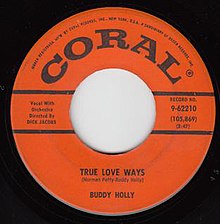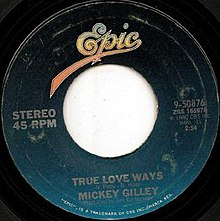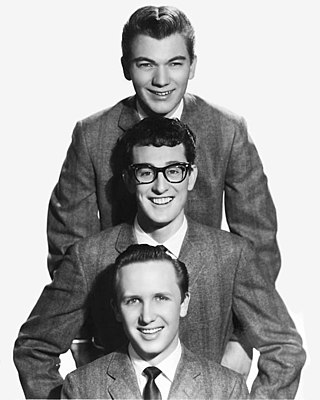
The Crickets were an American rock and roll band from Lubbock, Texas, formed by singer-songwriter Buddy Holly in January 1957. Their first hit record, "That'll Be the Day", released in May 1957, peaked at number three on the Billboard Top 100 chart on September 16, 1957. The sleeve of their first album, The "Chirping" Crickets, shows the band line-up at the time: Holly on lead vocals and lead guitar, Niki Sullivan on rhythm guitar, Jerry Allison on drums, and Joe B. Mauldin on bass. The Crickets helped set the template for subsequent rock bands, such as the Beatles, with their guitar-bass-drums line-up, performing their own material. After Holly's death in 1959, the band continued to tour and record into the 1960s and beyond with other band members through to the 21st century.

"That'll Be the Day" is a song written by Buddy Holly and Jerry Allison. It was first recorded by Buddy Holly and the Three Tunes in 1956 and was re-recorded in 1957 by Holly and his new band, the Crickets. The 1957 recording achieved widespread success. Holly's producer, Norman Petty, was credited as a co-writer, although he did not contribute to the composition.

Other People's Songs is a cover album by English synth-pop duo Erasure released on 27 January 2003.

"Not Fade Away" is a song credited to Buddy Holly and Norman Petty and first recorded by Holly and his band, the Crickets.
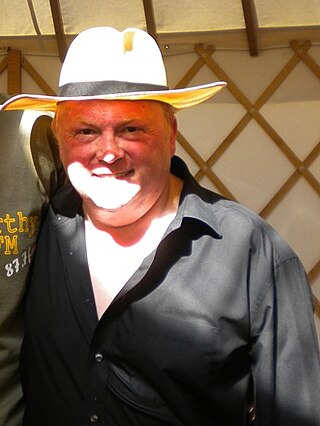
Michael Philip Batt, LVO is an English singer-songwriter, musician, arranger, record producer, director and conductor. He was formerly the Deputy Chairman of the British Phonographic Industry.

"I Can See Clearly Now" is a song written and recorded by American singer-songwriter Johnny Nash. It was the lead single from his twelfth album, I Can See Clearly Now (1972), and achieved success in the United States and the United Kingdom when it was released in 1972, reaching number one on the US Billboard Hot 100 and Cash Box charts. It also reached number one in Canada and South Africa. The song has been covered by many artists throughout the years, including a hit version by Lee Towers that reached no. 19 in the Dutch Top 40 in 1982, and another recorded by Jimmy Cliff for the motion picture soundtrack of Cool Runnings that peaked at no. 18 on the US Billboard Hot 100 in 1993.
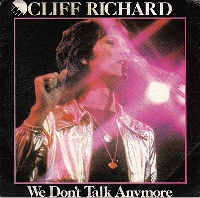
"We Don't Talk Anymore" is a song recorded by Cliff Richard, written by Alan Tarney and produced by the Shadows' rhythm guitarist, Bruce Welch. It was released in 1979 as a single and reached number one in the UK Singles Chart in August 1979, remaining there for four weeks, Richard's tenth UK number one and his first since "Congratulations" in 1968.
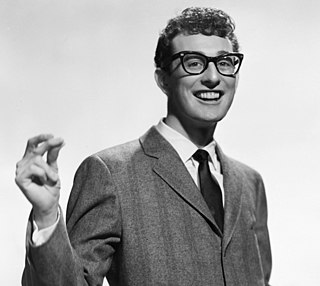
Buddy Holly recorded under several names and with several different backing bands. The Crickets played on almost all of his singles in 1957 and 1958.

"Heartbeat" is a rockabilly song originally recorded by Bob Montgomery and credited to Norman Petty. It was recorded most famously by Buddy Holly in 1958. The B-side of the single was "Well... All Right". "Heartbeat" reached the UK top 10 twice: once in 1975 for Showaddywaddy at number seven and again in 1992 for Nick Berry, recorded as the theme to the television series Heartbeat, which reached number two.

"Oh, Boy!" is a song written by Sonny West, Bill Tilghman and Norman Petty. The song was included on the album The "Chirping" Crickets and was also released as the A-side of a single, with "Not Fade Away" as the B-side. The song peaked at number 10 on the US charts, number 3 on the UK charts in early 1958, and number 26 in Canada.

"Bo Diddley" is a song by American rock and roll pioneer Bo Diddley. It introduced the rhythm that became known as the Bo Diddley beat and topped the Billboard R&B chart for two weeks in 1955. The song is included on many of Diddley's compilation albums including Bo Diddley (1958) and His Best (1997). Buddy Holly recorded a version that became his highest-charting single in the UK.
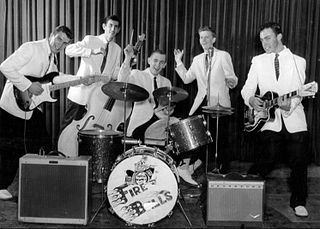
The Fireballs, sometimes billed as Jimmy Gilmer and the Fireballs, were an American rock and roll group, particularly popular at the end of the 1950s and in the early 1960s. The original line-up consisted of George Tomsco, Chuck Tharp (vocals), Stan Lark (bass), Eric Budd (drums), and Dan Trammell.
"That's My Desire" is a 1931 popular song with music by Helmy Kresa and lyrics by Carroll Loveday.

"I'm Gonna Love You Too" is a song written by Joe B. Mauldin, Niki Sullivan and Norman Petty, originally recorded by Buddy Holly in 1957 and released as a single in 1958. It was covered 20 years later by American new wave band Blondie and released as the lead single in the U.S. from their multi-platinum 1978 album Parallel Lines.

"Everyday" is a song written by Buddy Holly and Norman Petty, recorded by Buddy Holly and the Crickets on May 29, 1957, and released on September 20, 1957, as the B-side of "Peggy Sue". The single went to number three on the Billboard Hot 100 chart in 1957. "Everyday" is ranked number 238 on Rolling Stone magazine's list of the "500 Greatest Songs of All Time".
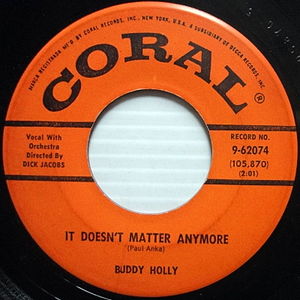
"It Doesn't Matter Anymore" is a pop ballad written by Paul Anka and recorded by Buddy Holly in 1958. The song was issued in January 1959, less than a month before Holly's death. "It Doesn't Matter Anymore" reached number 13 as a posthumous hit on the Billboard Hot 100 chart in early 1959, shortly after Holly was killed in a plane crash on February 3, 1959. The single was a two-sided hit, backed with "Raining in My Heart". "It Doesn't Matter Anymore" was Holly's last US Top 20 hit and featured the orchestral backing of Dick Jacobs. It was also successful in the United Kingdom, where it became the country's first posthumous number 1 hit.

"Miss You Nights" is a song written by Dave Townsend and made famous worldwide by Cliff Richard. The song has been recorded by numerous other artists, most notably Westlife, who released it as the second track on a double A-side single in 2003. The Westlife single reached number 3 in the UK singles chart.

"It's So Easy!" is a rock-and-roll song written by Buddy Holly and Norman Petty. It was originally released as a single in 1958 by the Crickets but failed to chart. It was the final release by the Crickets when Holly was still in the band.
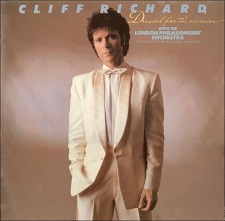
Dressed for the Occasion is an album by English singer Cliff Richard, recorded live with the accompaniment of the London Philharmonic Orchestra at the Royal Albert Hall in November 1982. It was released in May 1983 on the EMI label and reached No. 7 in the UK Albums Chart and No. 30 in Australia. It was certified Silver in the UK.

"Candy Man" is a song by Roy Orbison, released as the B-side to his international hit "Crying" in July 1961. It was later covered by British beat group Brian Poole and the Tremeloes, becoming a top-ten hit in the UK.
